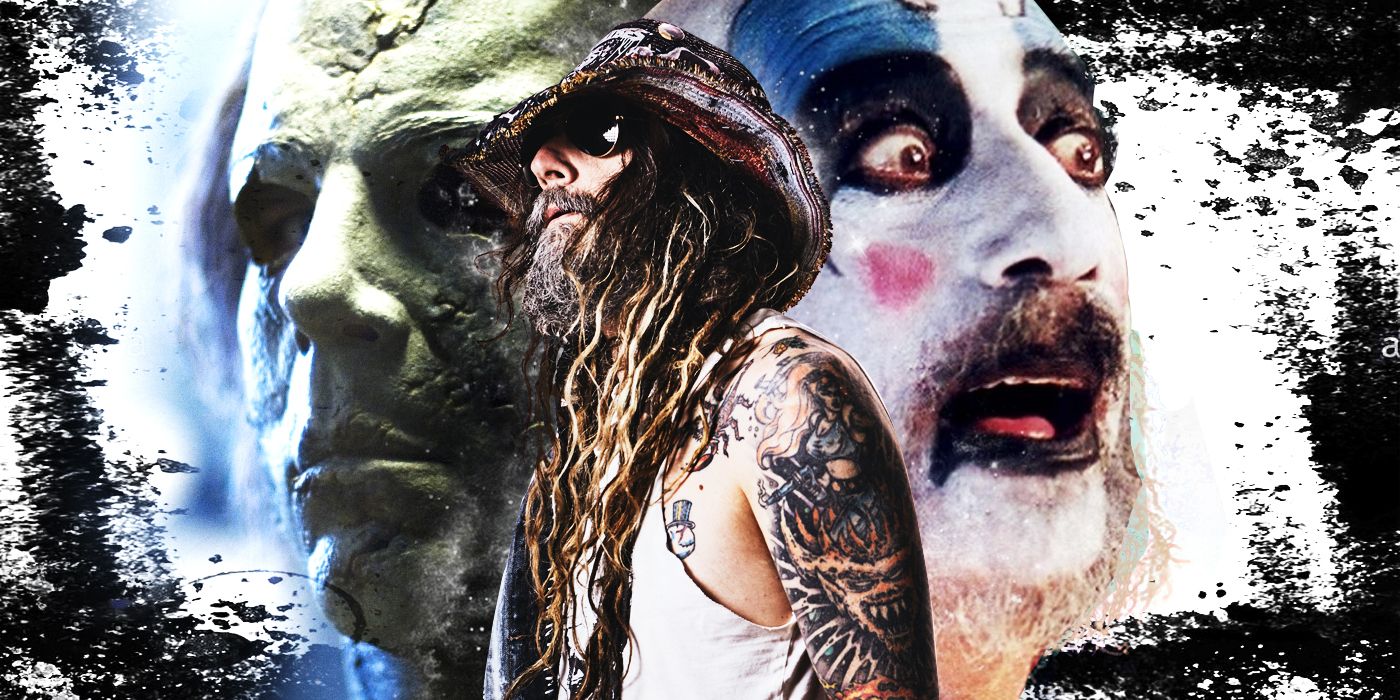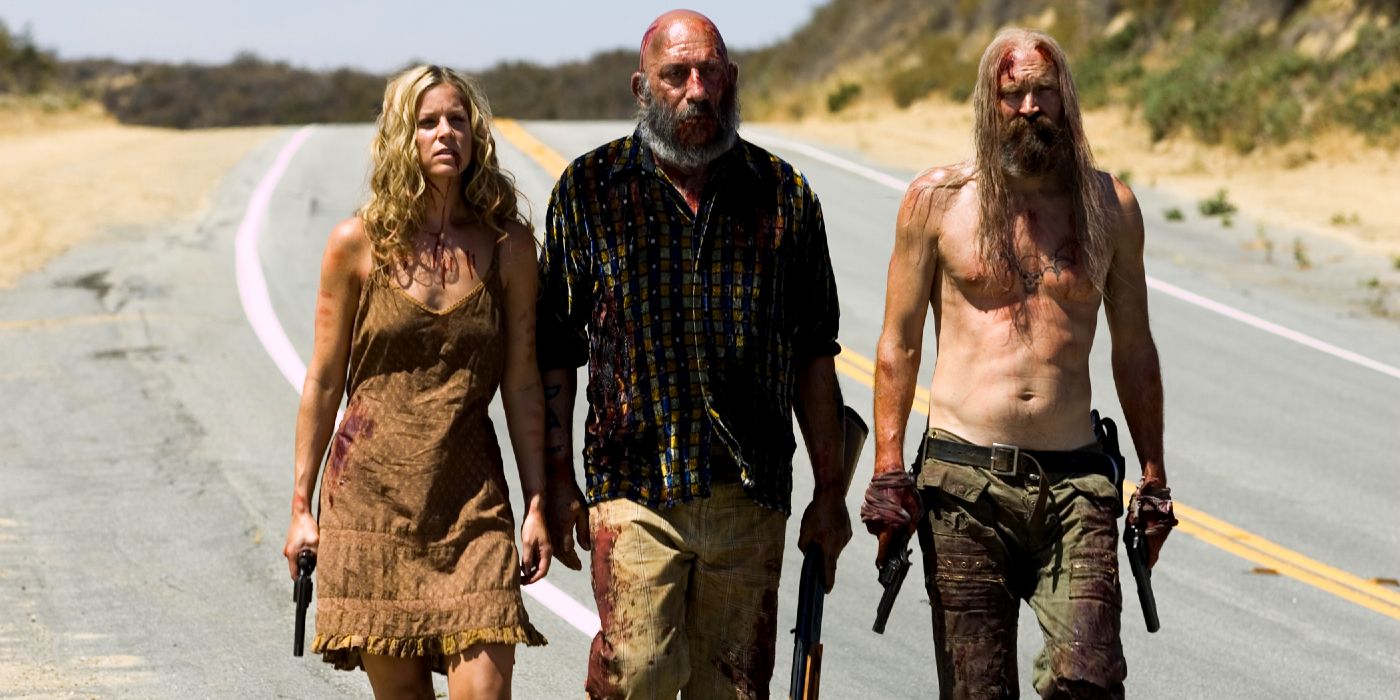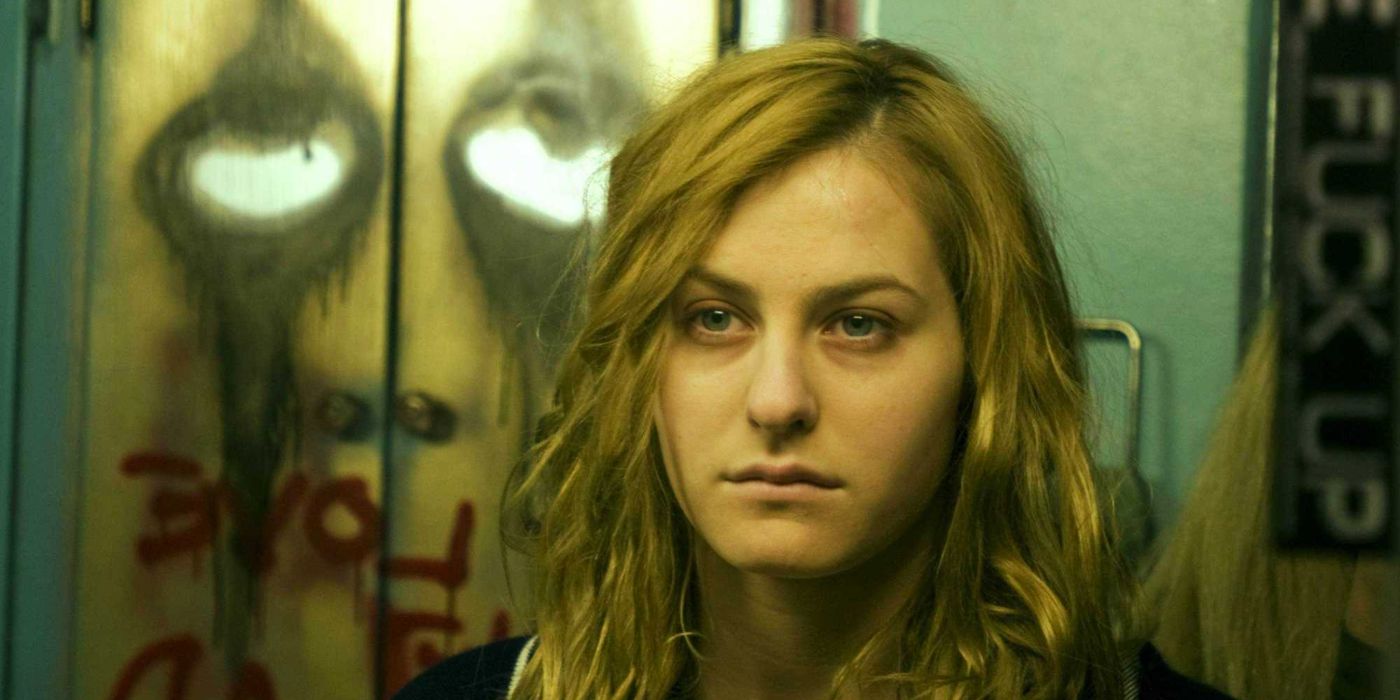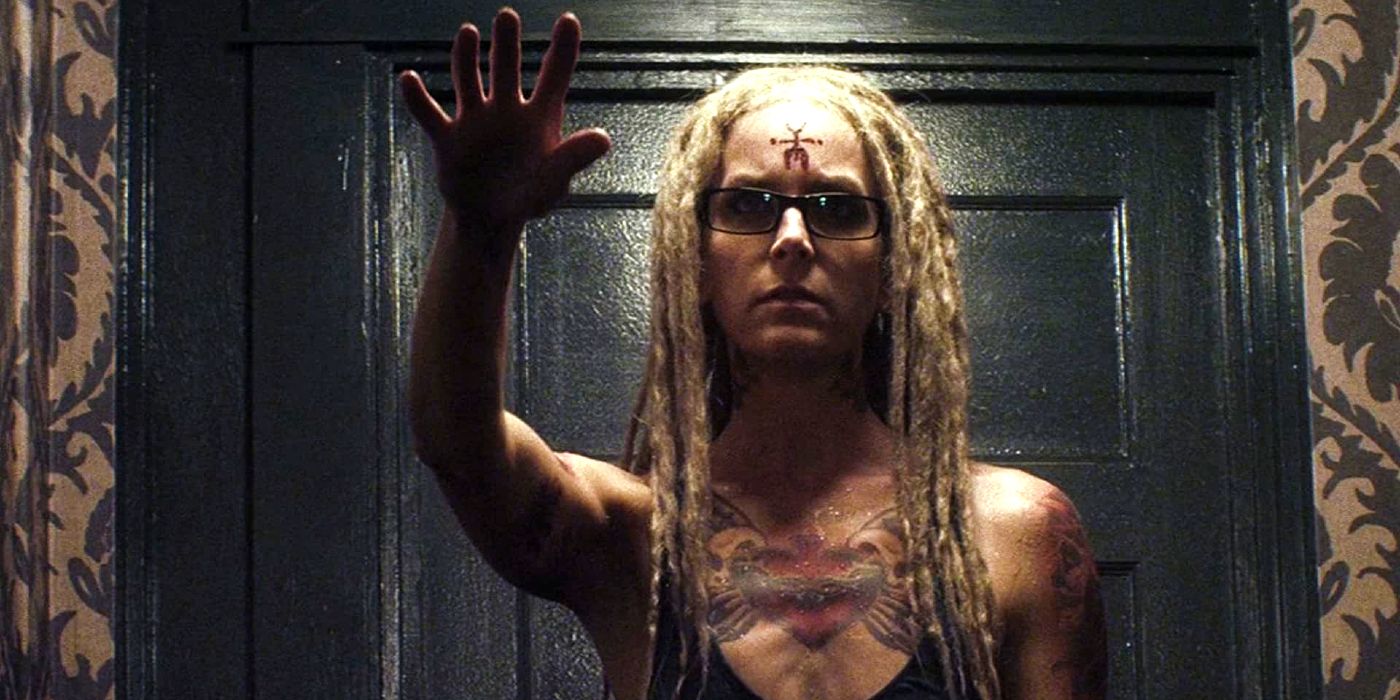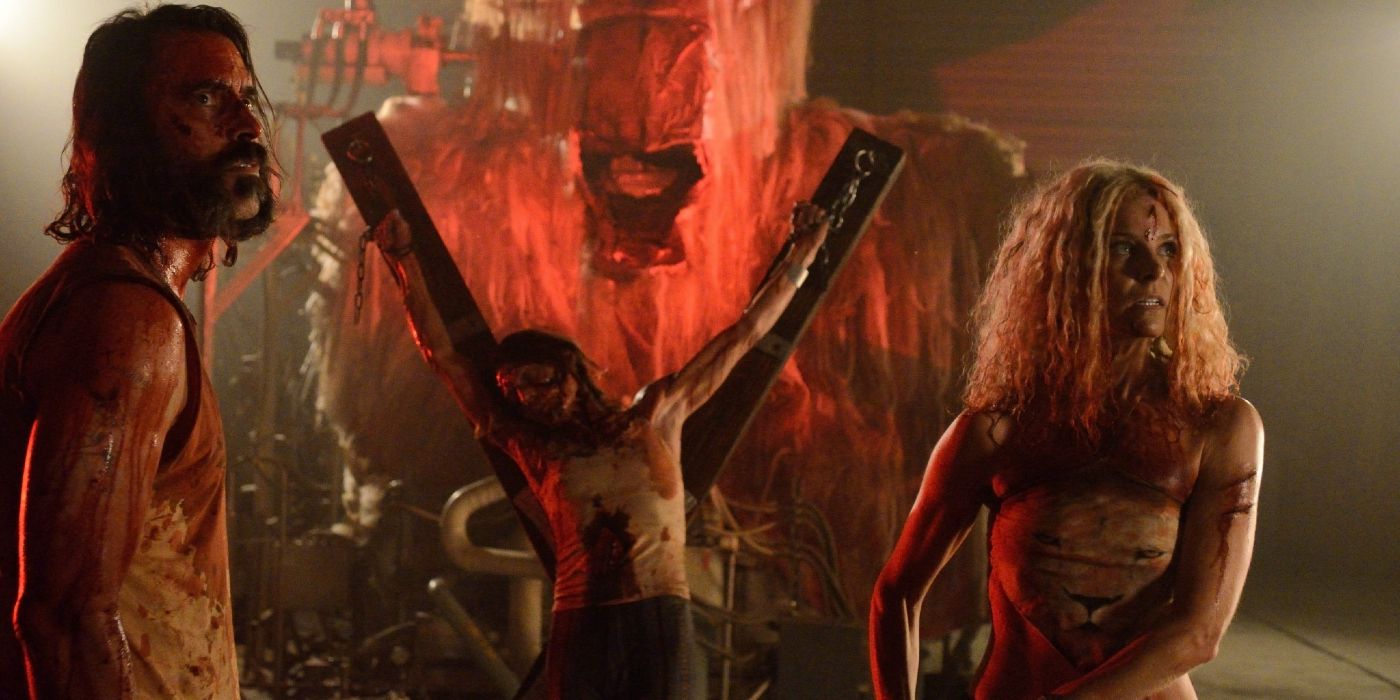Rob Zombie has become one of the most polarizing filmmakers in modern horror cinema. He has shown great vision and passion in creating gritty, nightmarish portrayals of evil. Yet the increasing flaws in his films, especially some of his most recent films, must be acknowledged. Zombie’s earliest work wasn’t perfect, but it showed the potential of what he could tap into, both honoring the films that made him a horror fan and building off them to establish his own identity as a filmmaker. Unfortunately, rather than growing in his craft, his filmmaking “evolution” has shown a lot of repetitiveness and even major problematic tendencies, including harmful hyper-sexualization, poor depictions of female characters, and half-baked storytelling. I recently revisited Zombie’s films to re-examine both the problems and strengths in his filmmaking journey. While I witnessed many of the same issues, I also found that I appreciated some of his work more with added time and perspective.
The debut of the inhumane and sadistic Firefly clan in House of 1000 Corpses in many ways gives us Zombie at his best, serving as an homage to horror films that he and many horror fans grew up with. It demonstrates Zombie’s genuine passion for the genre and his eagerness to explore the true level of depravity man is capable of in a stylistic and perversely fun way. House of 1000 Corpses has a gritty style that ranges from colorful and tongue-and-cheek to utterly depraved and cold. As the film progresses, it feels like a trippy, murderous fever dream, with a color palette ranging from blackness to neon rave-like color splashes. House of 1000 Corpses oozes tribute to the history of horror, even in the set design, which heavily features The Creature from the Black Lagoon. There are Halloween-adjacent quotes, constant views of characters watching classic horror on televisions, and an ongoing celebration of true crime and macabre entertainment in many forms.
While the film covers familiar territory, it still manages to have an identity of its own and stand out as the start of something special. A key component is the unforgettable Firefly clan and how well the cast rose to the challenge of making these characters iconic. Sid Haig is the stand-out as Captain Spaulding. Working off of twisted clowns who came before him with influences ranging from Pennywise to John Wayne Gacy, Haig is charismatic, fearsome, and demented in a way that is equally bone-chilling and magnetizing. Despite the fact that Zombie doesn’t often write the strongest female characters, this isn’t much of an issue in House of 1000 Corpses. Baby (Sheri Moon Zombie) uses her teasing, sexual nature as a weapon, but it feels realistic given the nature of what we are shown of her and her family and doesn’t seem overdone. The entire cast of characters work off each other wonderfully, adding another layer of terror in showcasing how each one is just as inhumane and maniacal than the next. Of the three films in the Firefly Saga, House of 1000 Corpses gives us the most fun, colorful, morbid, and entertaining ride through this road-side house of horrors that turns all too real. There’s a certain simplicity that works well too, where the other films are more meandering.
The Devil’s Rejects gives us a more intimate, character-focused film. The Firefly family’s brutal crimes are now highly publicized, but they show no signs of slowing down even with a relentless sheriff on their heels determined to bring them to justice. Echoing the film’s title, the strongest aspect of The Devil’s Rejects is how it dives deeper to expose the Firefly family’s degree of sociopathic tendencies, hinting that they are too perverse and uncontrollable even for the Devil himself. The actors have grown into their roles and their strong chemistry together powers the film.
However, upon revisiting The Devil’s Rejects it wasn’t as strong of a film as I remembered. It loses steam towards the end of the second act and falls into long stretches of crude filler conversations about such topics as "pig fucking." We start to see the hypersexualization and degrading language that has become one of the least appealing qualities of a Rob Zombie film. I can excuse some of this considering the types of characters we are dealing with, but it almost becomes a bigger focus than advancing the story, relationships, and themes. Essentially, it deteriorates into disorganized shock value that sets the film back. While The Devil’s Rejects is a captivating and crazy ride, it begins to show the flaws in Zombie’s filmmaking and his tendency to prioritize sleazy trash talk over storytelling. The film does manage to end incredibly strong in a suspenseful man hunt that ends in a tragic blaze of glory that would have been an iconic way to end the twisted Firefly story.
The only point of remaking a classic like John Carpenter's Halloween is to bring something new to the table. Rob Zombie does that with 2007’s Halloween, showing what could have led young Michael Meyers to become the sadistic silent killer we know and love. Zombie’s vision of Michael’s dark ascension paralells the origins of many real-life serial killers without painting his home life as a total victim story. This version of Michael was bullied and belittled, but he also knew love. I understand that some prefer the mystery of Michael and his portrayal as the devil himself, but this perspective offers more compelling shades of gray. He is certainly beyond being reached and is far more monster than man, but he still has thoughts and wants, albeit twisted ones.
Sheri Moon Zombie’s performance as Deborah Meyers gives the film its most powerful emotions. Deborah is a mother genuinely trying to provide the best possible life for her son, whom she loves dearly. Watching her still try to understand and care for Michael in spite of the horrific violence he inflicted is heartbreaking. In particular, her final scene showcases just how difficult it is to feel like you both failed your child and raised a killer. Moon Zombie brings out a great deal of depth and conflicting emotions in Deborah’s anguish that gives the character a beautiful yet horribly tragic exit.
Halloween II can feel like a chaotic deviation from the original identity and focus of Carpenter’s Halloween franchise, but it represents Zombie in rare form: eager and willing to make bold, challenging decisions that tap into psychological horror and the haunting nature of human trauma. Thus, Halloween II shows great promise for Zombie’s capabilities and instincts as a filmmaker in the genre as he explores how suffocating, isolating, and enraging it can be to simply survive an ordeal like the first Halloween. We are introduced to a far angrier and broken Laurie (Scout Taylor-Compton), as she tries to find a way to endure after Michael murdered her friends in the previous film. She is suffocated by her rage as horrific visions of Michael and the Meyers family continue to dig her wounds open without mercy. Laurie soon finds out she is Angel Meyers, Michael Meyer’s sister, making her not only his victim but perhaps his successor as well.
Visually the film is chaotic and almost experimental in nature, representing Laurie’s mindset. Zombie lets the audience breathe for moments outside the nightmarish visions, but he always lets these moments linger, taunting both Laurie and the audience while also hinting at an inevitable nature within her. Laurie knows she can be ambushed by her horrific past and present demons at any moment, serving as a great representation of what it can be like to deal with PTSD, anxiety, and depression.
The Lords of Salem was the first time Zombie was given total creative control and it shows. Arguably his best film, it illustrates the vision and range he is capable of as a filmmaker. It opens on intercut footage of a dazed young woman named Heidi (Moon Zombie), a pledged witch hunt, and a coven seen in primal, animalistic glory. We are immediately given a taste of some powerful force behind the evil and a hint that these three subjects are connected, but from there the film takes things far slower. Zombie lets us get to know and care for his non-villainous characters (which is a rare treat in his filmography), with a significant portion of the movie focusing on Heidi, a radio personality living in modern day Salem. The Lords of Salem is a mood piece, focusing on slowly creeping dread, a nice change of pace for Zombie that works wonderfully. Zombie cites films like The Shining and Rosemary’s Baby as inspirations for the film. The visual style is incredible and really works as a macabre art piece.
The story is simple but effective, tapping into the darkness of our own history and how some ghosts of the past won’t stay buried. As in Halloween II, Zombie plays with the idea of being doomed by your own bloodline. Family is clearly one of Zombie’s favorite themes to explore and in these two films he shows the merits and curses it can bring. It doesn’t matter who Heidi is as a person or what she does to resist her fate because it is inevitable, which makes it an incredibly heartbreaking tale. The ending is extremely bizarre and takes more of an experimental turn, but it serves as a fitting end to this tale of slowly creeping evil.
The film is also refreshing in that it gives us Rob Zombie’s strongest female character to date. Despite some occasional partial nudity, Heidi isn’t an oversexualized character; she is intelligent, capable, and relatable. Unfortunately, her character is doomed from the start and consequently isn’t the most hopeful view of being a woman of depth and strength. Still, it’s a worthy step in the right direction towards giving us well-rounded and realistic female characters, one of the things I have found to be the most lacking in Zombie’s films.
31 is the epitome of Rob Zombie’s shortcomings as a filmmaker, which is doubly frustrating because it followed his most promising film to date. In 31, he regresses to half-baked storytelling and demeaning, unrealistic, and oversexualized one-note female characters. Stylistically, it’s basically a retread of House of 1000 Corpses, which could have been a fun throwback if he had something new to offer. The film follows a group of traveling carnival performers who are kidnapped and brought to a circus of horrors where they are forced to fight to the death against ruthlessly sadistic killers.
While it’s a twisted and compelling concept, the film leaves you with so many questions. Who is paying for this tournament of human suffering? What is their motive? Do they simply crave adrenaline-fueled bloodshed? Are there any personal vendettas at play? We really have no idea. Additionally, the clown killers in the tournament feel like a missed opportunity. They offer a twisted style and sadistic energy, but they come off as extremely one-dimensional. There is nothing particularly interesting about them as there is no hint of the mindset or motives behind the hunters. Not only is it a missed opportunity to show some depth, explore the dark side of mankind, and dig into the mind of a killer, which is a theme Zombie typically relishes, but it also makes the story fall flat and feel that much less grounded.
Sheri Moon Zombie stars as Charly, a character whose whole identity is wrapped around being hypersexual. Rob Zombie likely intended for Charly to be a bad ass, but she only survives the film thanks to the sacrifice of her companions and pure dumb luck. She has moments of strength but all in all she’s a disappointing, weak, and unrelatable character. 31 offers solid brutality and a few captivating performances, but overall, it is an extremely frustrating, underdeveloped, and problematic film that could have been so much better.
Rob Zombie’s latest film 3 From Hell brings us back to the beginning of his filmmaking career, reviving the Firefly clan in the process. While it is a vast improvement from 31, it is an unnecessary sequel that undoes the violent and poetic ending The Devil’s Rejects left us with. 3 From Hell is split into three different films, each with a distinct style. The film begins as a true crime TV special about the Firefly family, offering the strongest element of the film and one of Zombie’s most well-tuned explorations -- examining society’s fascination with serial killers. The second act focuses on Baby’s rivalry with a prison guard (Dee Wallace) who is determined to break the already unstable killer. This chapter offers a look into Baby’s increasingly unhinged mind, showing how isolation has taken its toll on her. From there we see Otis Driftwood (Bill Moseley) escape execution as he goes on the run with his half-brother, the Midnight Wolf, (Richard Brake), ultimately targeting the warden and creating a bloody home invasion to free Baby. The last act of the film unites the “3 from Hell” in the most enjoyable chapter of the film, embracing their freedom with a colorful, macabre style as they indulge in all the mayhem they can inflict.
While the film is mostly about reuniting this twisted family to paint the town red again, there are some stronger depictions of women than we see in Zombie’s other movies. There are many who are throwaway characters for the Firefly family to bed and then slaughter, but there are also characters such as the warden’s wife and Wallace’s vengeful prison guard who hold their own against such unflinching evil.
Rob Zombie shines most as a filmmaker when he is bold and makes daring choices, working off the inspiration of classic horror cinema while creating a vision of his own. With Halloween II and even more effectively with The Lords of Salem, he has shown how he can weave dark psychological material into haunting and provocative art. He is at his worst when he regurgitates the country-bred, crude talking sadistic killers he began with. The Lords of Salem is really the only film where he dabbled in a visual style that felt like a unique departure. I understand having a niche style or core group of characters you like to stick to, but in his case, this tends to lead to unrealistic, one-dimensional films and characters that hold him back from his growth as a filmmaker.
Currently, Zombie is attached to direct the upcoming The Munsters reboot, and that could be a great opportunity for him to grow as a filmmaker. The film could utilize his proven strengths both in honoring classic horror cinema and creating an off-beat, macabre and captivating family of characters. There are also certain expectations in tone and content based on the beloved original material that could give him a promising challenge while pushing him outside of his comfort zone. As a self-described lifelong Munsters fan, his genuine passion should be evident, and hopefully it will push him to add something to the already iconic legacy as he did with the Halloween franchise. Zombie’s filmmaking can be lazy and one-note at times, but he has proven he can craft macabre, provocative, and magnetizing work when there is drive and vision behind it.

